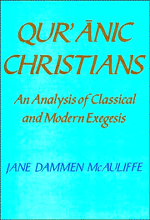2 - From Ṭabarī to Ṭabāṭabāʾī
Published online by Cambridge University Press: 24 February 2010
Summary
Given the vast literature generated by centuries of Muslim exegetical effort, no topical study within that genre can aspire to comprehensive coverage. Inevitably some principle of selection must govern the choice of those works to be examined and discussed. In the present instance several intersecting concerns prompted the decision to concentrate upon the ten exegetes (mufassirūn) whose lives and commentaries are introduced in this chapter. Chronological considerations centered upon the desire to provide a spectrum of exegetical analysis ranging from the late ninth to the late twentieth century. That span of centuries commences in the classical period of Islamic thought with the foundational commentary of Abū Jaʿfar b. Jarīr al-Ṭabarī and concludes with the work of the recently deceased Iranian exegete, Muḥammad Ḥusayn Ṭabāṭabāʾī.
Sectarian inclusiveness forms a second, convergent spectrum. Four of the commentaries selected, two in Persian and two in Arabic, are by Shīʿī authors. This subcategory itself replicates the chronological span from classical to contemporary. The remaining six commentators may be loosely classed as Sunnī, yet this overriding designation shelters a variety of divergent perspectives. Theological orientations mark the Muʿtazilī identification of al-Zamakhsharī's commentary and Fakhr al-Dīn al-Rāzī's association with Ashʿarī thought, while legal representation, such as that of the Ḥanbalī madhhab, is provided by both Ibn al-jawzī and Ibn Kathīr. A modernist agenda shapes issues addressed by Rashīd Riḍā in his Tafsīr al- Manār as well as by his younger contemporary, Ṭabāṭabāʾī. Although space restriction necessarily confined the ideal scope of this study, for contrastive purposes occasional allusion has also been made to a representative Ṣūfī tafsīr.
- Type
- Chapter
- Information
- Qur'anic ChristiansAn Analysis of Classical and Modern Exegesis, pp. 37 - 90Publisher: Cambridge University PressPrint publication year: 1991



